News
Young African professionals share how they have been empowered to tackle environmental challenges
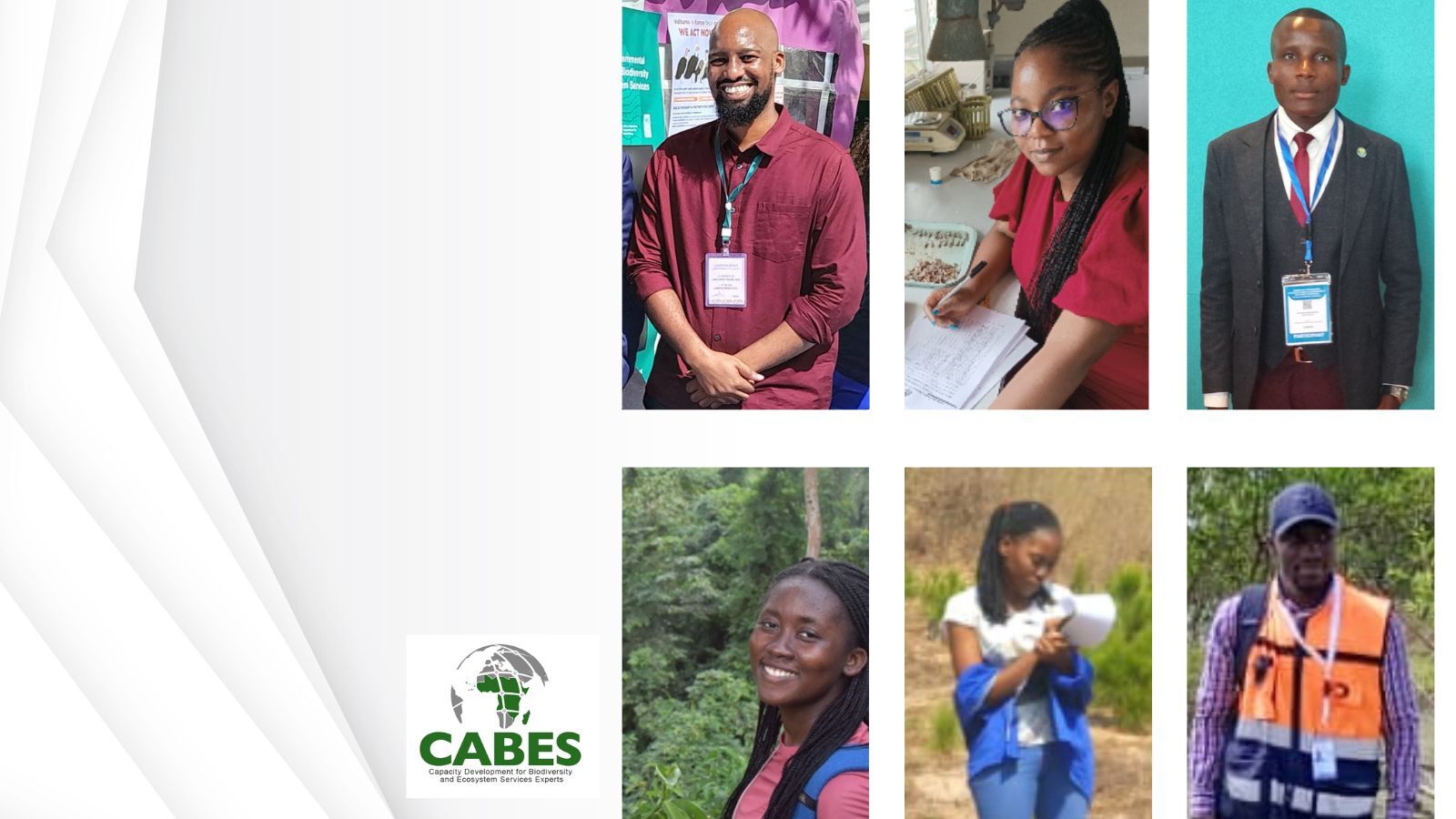
Story | Sep 2024
Many young people are informed and passionate about environmental issues. The world needs the engagement of these young professionals to equitably address the triple planetary crisis. In turn, youths need to be empowered to participate meaningfully in multilateral environmental processes.
To make this possible, over the past decade the UN Environment Programme World Conservation Monitoring Centre (UNEP-WCMC) has partnered with international and national institutions to develop and strengthen the capacity of young professionals in biodiversity-related fields across Africa.
The initiative began in 2017 with the West African Biodiversity and Ecosystem Services (WABES) programme. WABES aimed to boost the engagement of West African stakeholders in the Intergovernmental Science-Policy Platform on Biodiversity and Ecosystem Services (IPBES) process, the intergovernmental body that provides an interface between science and policy on biodiversity and ecosystem services. WABES also sought to establish national focal points for IPBES. By 2022, when the WABES programme ended, 30 students from 15 countries in West Africa and Morocco had graduated with a Master of Science in Science-Policy Interface for Biodiversity and Ecosystem Services (SPIBES) through WABES, imparting them with the knowledge and skills needed to navigate the interface between science and policy for the conservation of biodiversity. Degrees for the two-year transdisciplinary programme were awarded by the Université Félix Houphouet-Boigny in Côte d’Ivoire.
To continue and broaden this the Capacity Development for Biodiversity and Ecosystem Services Experts in West, Central and East Africa (CABES) initiative was developed. CABES continues to offer the MSc programme on SPIBES on a larger scale in West, Central and East Africa. In addition to the Université Félix Houphouet-Boigny in Côte d’Ivoire, which targets youths from West Africa, SPIBES is hosted by the University of Lubumbashi, Democratic Republic of Congo and Addis Ababa University, Ethiopia, reaching young people from central and east Africa, respectively. Successful candidates are offered a fellowship that covers tuition fees, field research budget, stipend for living expenses and a round-trip airline ticket.
Below some incoming, current and alumni share how they have benefitted from the SPIBES MSc:
Andrew Orina, current SPIBES student at Université Félix Houphouet-Boigny
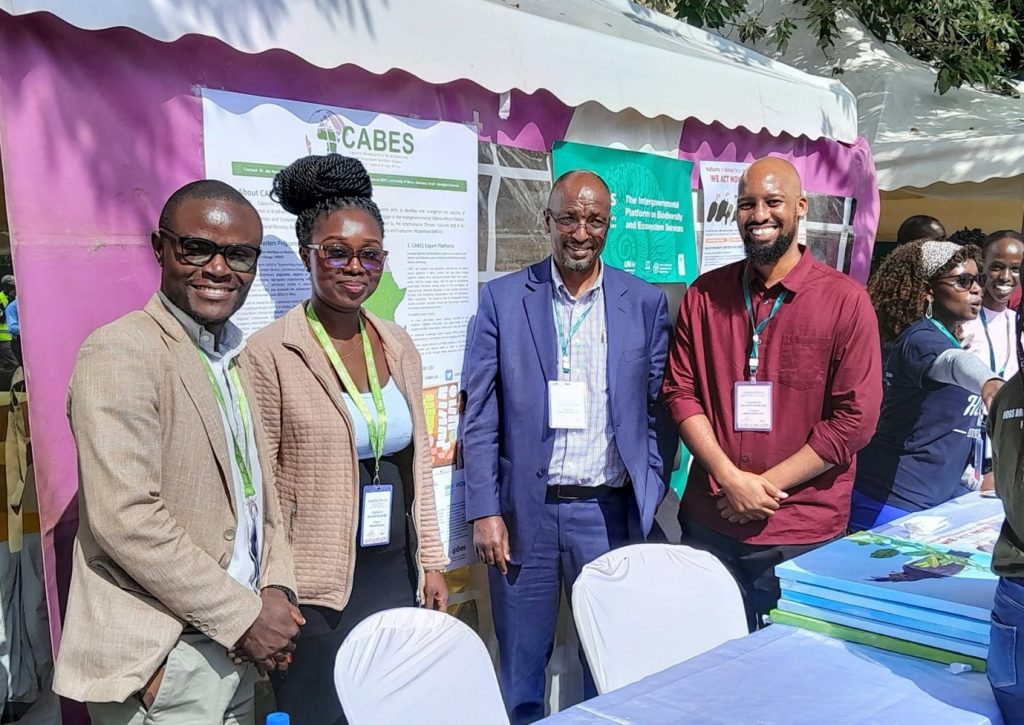
I understand that policy without practice is useless, practice without policy is aimless and without underpinning knowledge both become worthless. In my view, the SPIBES programme brings all these three components together, which is what piqued my interest in the programme.
I am a Kenyan with a BSc in Forestry from the University of Eldoret. As a social ecologist, I aim to connect the dots between environmental and social issues. My MSc research has taken me to the pastoral fields of Loima in Turkana, Kenya, looking at the perceptions and ecological value of pastoral forage trees. I have seen how a lack of policy grounded in practice can affect a community. In the Loima pastoral fields, the absence of a policy that integrates traditional pastoral practices with modern conservation efforts has led to a decline in the ecological value of pastoral forage trees, making the community even more destitute.
My choice of research topic and application for the SPIBES program were influenced by the desire to ensure that policy, practice and science can communicate with each other.
Participating in the SPIBES MSc programme has significantly advanced my ability to conduct comprehensive policy research beyond conventional frameworks. For instance, I can now conduct in-depth policy analyses, develop evidence-based policy recommendations, and assess the potential impacts of proposed policies on biodiversity and climate change. It has provided me with the tools to analyse and address complex environmental challenges from a holistic perspective.
I have also had several enriching experiences. One of them was participating in the sixth IPBES Youth Capacity Building Forum in Nairobi in May 2023. This meeting was important as it emphasised the role of youth in biodiversity conservation and policymaking. It brought together representatives from various youth organisations and networks to identify specific capacity-building needs and explore ways to enhance these at national, regional and global levels.
Mulabengwa Mbulo, new SPIBES student at University of Lubumbashi, DRC
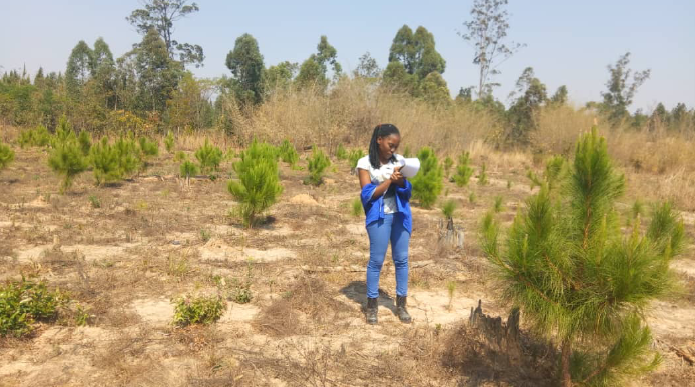
In Zambia we face multiple environmental challenges related to policy implementation and climate change.These challenges are now evident in the drying of rivers, causing load shedding andreduced farming production, which will affect the achievement of the SDGs by 2030.The balance between wildlife and human activities is also at risk. By participating inthis program, I aim to contribute to mitigating these issues through informed policyand practice.
My long-term career goal is to work with governmental and non-governmental organisations in formulating and implementing policies that promote sustainable land use and biodiversity conservation. The MSc program attracted me because it offers a comprehensive approach to understanding and addressing these challenges through interdisciplinary training and practical applications. The focus on linking scientific research with policymaking and practice aligns perfectly with my career aspirations.
I hope to actively participate in IPBES assessments and events, gaining insights into global biodiversity trends and policy responses. Engaging with IPBES National Focal Points and other stakeholders will provide invaluable networking opportunities and a deeper understanding of the international environmental policy landscape. I also look forward to collaborating with fellow students and faculty on research projects, contributing to real-world solutions to the challenges facing biodiversity and ecosystem services. These experiences will enhance my ability to influence policy and practice in Zambia and beyond.
Chanis Clèche, new SPIBES student at University of Lubumbashi
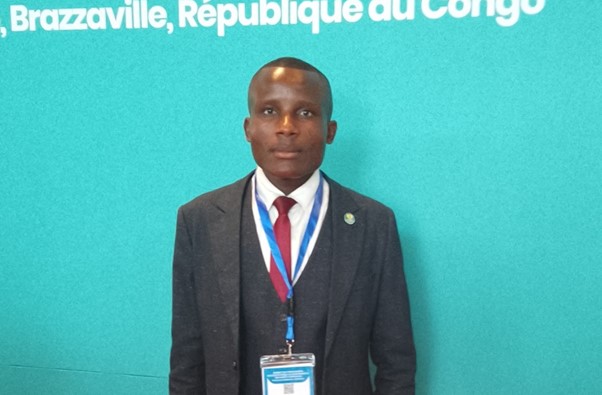
I was born in the north of the Republic of Congo, in the equatorial forest. From childhood I was in contact with biodiversity and grew up taking advantage of several ecosystem services. As I grew up, I realised that biodiversity is vulnerable and that human activities reduce its capacity to provide ecosystem services. Faced with this emergency, I could not remain a spectator but wanted to be an active participant in addressing it. I chose to pursue environmental studies to better understand, love and preserve nature.
The Congo basin contains 10 per cent of the world’s biodiversity and my country a good part of this, with its national parks, biodiversity reserves, sanctuaries and hunting reserves. Understanding and sustainably managing this biodiversity requires experts. However, the Republic of Congo does not have enough. This pushes me to join this Master’s degree: to contribute to IPBES and make the voice of my country and my sub-region heard internationally regarding the ecosystem services provided by our forests and our biodiversity.
My career goals are to be an environmental consultant, expert in biodiversity and ecosystem services, and specialist in sustainable ecosystem management. By participating in this program, I will be well-equipped to actively contribute to the conservation of biodiversity, the sustainable management of natural resources and the achievement of the Sustainable Development Goals in Africa in general and in my country in particular, as well as internationally through IPBES.
Prisca Kouakou, SPIBES alumna graduated 2018 from Université Félix Houphouet-Boigny
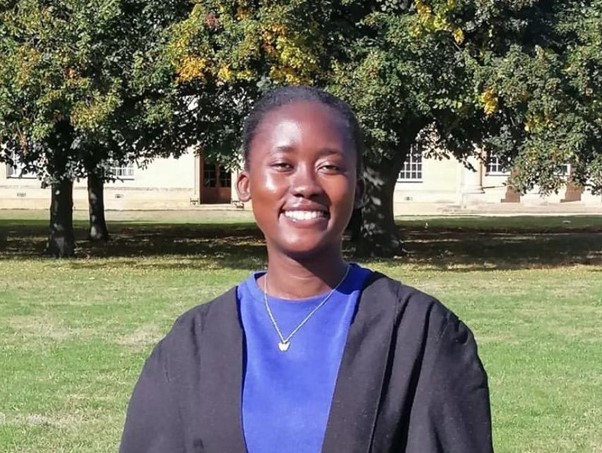
I am a PhD candidate in Human Geography at the University of Cambridge. My current research focuses on understanding the conditions under which supply chain sustainability initiatives can lead to agroforestry adoption and how that influences social and ecological outcomes in the cocoa sectors of Côte d'Ivoire and Ghana.
The MSc SPIBES built my scientific confidence and provided the background knowledge needed to pursue a PhD at the University of Cambridge. Thanks to the SPIBES programme, I have been equipped with the necessary interdisciplinary skills to work on my current research project.
The programme deepened my knowledge and strengthened my capacity for interdisciplinary research on conservation and sustainable development. My MSc research focused on evaluating the performance of pollination services for cashew agroforests near Comoé National Park in Côte d'Ivoire using bee samples and household surveys. I also developed an interest in landscape governance and restoration through Nature-based Solutions. Moreover, the international nature of the programme, which brought together 15 experts from West Africa, allowed me to build a solid scientific network and understand the crucial link between practice and theory in conservation efforts. Finally, the programme allowed me to improve my scientific communication skills with policymakers by learning how to design policy brief notes.
I attended the seventh session of the IPBES plenary in 2019, a pivotal event that significantly enriched my understanding and involvement in international conservation efforts. I assisted in revising the IPBES Global Assessment Report on Biodiversity and Ecosystem Services with leading experts in the field, which has been instrumental in shaping my career trajectory.
Diallo Abdoulaye Djibril, SPIBES alumni, graduated 2023 from Université Félix Houphouet-Boigny
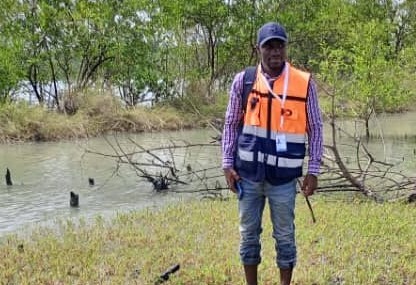
This is a highly competitive Master’s programme with a sub-regional dimension, which aims to create experts capable of engaging at an international, regional, sub-regional, national and local level in science-policy interfaces such as IPBES. The programme has been very rich in terms of experience, allowing me to be in contact with experts involved in the management of biodiversity and ecosystem services both in Africa and internationally.
I had the opportunity to take part in workshops reviewing IPBES documents, in particular in 2021 the scoping documents for the Business and Biodiversity Assessment; the thematic assessment of the links between biodiversity, water, food and health; and the thematic assessment of the underlying causes of biodiversity loss, drivers of transformative change and options for achieving the 2050 vision for biodiversity.
With its interdisciplinary approach that links theory and practice through internships, case studies and field visits on the one hand, and the translation of research results into decision-making tools and policies on the other, the programme is a significant asset for achieving my professional goals.
A Guinean by nationality, I am currently working as a consultant in charge of biodiversity for mining companies operating in our country, as well as for a project financed by the World Bank on behalf of our Ministry of Mines and Geology and the Ministry of Environment and Sustainable Development.
Rejoice Vimbiso Matangi, current SPIBES MSc at Université Félix Houphouet-Boigny
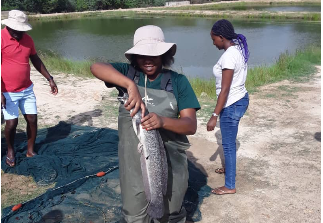
As an African youth with the full capacity to understand the dire situation we face with regards to biodiversity loss and climate change, I knew that there is need for science and policy to work together and inform each other. Born and bred in Zimbabwe, I also understood the reality of a young continent like Africa whose leadership crave development in terms of infrastructure, technologies and food systems, and that if we are not careful this may be at the expense of our natural resources.
So for me this Master’s is an empowering tool and space to collaborate internationally with other like-minded youths. For example, in December 2023, I had the privilege of joining a networking opportunity provided within SPIBES at the Santa Fe Institute Complexity Global School in South Africa, where I participated in a group project mapping climate financing using a network-based analysis model. Together, we can gather actionable solutions to our collective problems so that we all address development agendas and conservation as a simultaneous goal, while embracing science through research and informing policymakers.
At the moment for my MSc, I am a research intern at the Zimbabwe Parks and Wildlife Management Authority’s Lake Kariba Fisheries Research Institute, where I am studying how protected areas can enhance sustainable fisheries management and livelihood development in Lake Kariba, Zimbabwe. The MSc sets a higher bar by the fact that it is international and transdisciplinary. I feel able to spread my wings into the fields of agriculture, mining, even in commerce as I have already started to participate on issues around climate financing.
Building capacity in the coming months
Between now and the end of 2024, the CABES programme is working hard to increase engagement in IPBES, from the regional to the international levels.
From 10-11 October, CABES will hold its first Central Africa sub-regional workshop in Lubumbashi, Democratic Republic of Congo. Under the theme: ‘Development of Multi-stakeholder Biodiversity Platforms: Increasing Contributions to National Biodiversity Strategies and Action Plans (NBSAP) and IPBES Activities’, the workshop will bring together stakeholders from science, policy and practice, including Indigenous Peoples and local communities. It will facilitate science-policy dialogues for biodiversity conservation, knowledge-sharing on the Kunming-Montreal Global Biodiversity Framework (GBF) and its interlinkages with IPBES work and knowledge products, and networking opportunities. For the youths, it will present a great opportunity to co-create knowledge with other scientific and non-scientific actors, and career networking.
And between 9 and 16 December at the 11th session of the Plenary of the Intergovernmental Science-Policy Platform on Biodiversity and Ecosystem Services (IPBES-11), the CABES team will be on-site in Windhoek, Namibia. At the IPBES Stakeholder day and IPBES-11 plenary, CABES will showcase outputs from its capacity-building activities across Africa, and network with stakeholders to promote uptake of IPBES assessments.
The CABES and WABES MSc SPIBES programmes, coordinated by the Centre for Development Research (ZEF) at the University of Bonn in Germany, were established in cooperation with key global partners on sustainability issues such as the UN Environment Programme World Conservation Monitoring Center (UNEP-WCMC), Cambridge, United Kingdom; Université Felix Houphouet-Boigny, Côte d’Ivoire; West African Science Service Center for Climate Change and Adapted Land Use (WASCAL); Coknow Consulting, Germany; University of Lubumbashi, Democratic Republic of Congo; and the Horn of Africa Regional Environment Center and Network (HoA-REC&N), Addis Ababa University, Ethiopia. Both projects were funded by the International Climate Initiative (IKI) of the German Federal Ministry for the Environment, Nature Conservation, Nuclear Safety and Consumer Protection (BMUV).
Have a query?
Contact us
communications@unep-wcmc.org
